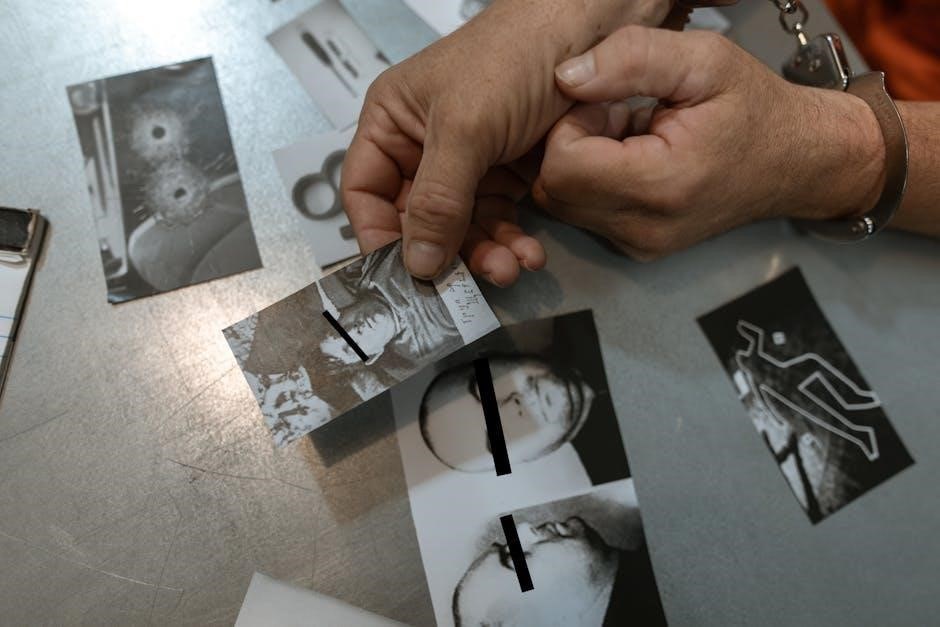Criminal investigation involves systematic processes to gather evidence‚ analyze facts‚ and solve crimes. The 11th edition provides a comprehensive guide‚ covering fundamental principles‚ modern techniques‚ and legal frameworks essential for effective criminal investigation.
1.1. Overview of Criminal Investigation
Criminal investigation is a systematic process to identify and apprehend criminals through evidence collection and analysis. The 11th edition highlights key techniques‚ legal frameworks‚ and psychological insights. It explores crime scene management‚ forensic science‚ and witness interrogation. This resource also examines historical and modern approaches‚ providing a global perspective on investigative practices.
1.2. Importance of Criminal Investigation in Modern Justice Systems
Criminal investigation is crucial for upholding justice‚ ensuring accountability‚ and maintaining public safety. It provides evidence to support prosecutions‚ reduces crime rates‚ and restores victim confidence. Modern systems rely on thorough investigations to address complex crimes‚ from cyber offenses to organized crime. The 11th edition emphasizes the role of technology‚ forensic science‚ and ethical practices in enhancing investigative accuracy. Effective criminal investigation ensures fairness‚ transparency‚ and the protection of civil liberties‚ making it a cornerstone of modern justice systems.

Key Concepts in Criminal Investigation
Key concepts in criminal investigation include crime classification‚ evidence collection‚ and forensic analysis. These principles guide investigators in solving crimes effectively.
2.1. Types of Crimes and Their Classification
Crimes are classified into various categories based on their nature and severity. These include violent crimes‚ property crimes‚ white-collar crimes‚ cybercrimes‚ and transnational crimes. Violent crimes involve harm to individuals‚ such as murder or assault. Property crimes‚ like burglary or theft‚ focus on material loss. White-collar crimes involve financial fraud or corporate misconduct. Cybercrimes encompass digital offenses‚ including hacking and identity theft. Transnational crimes‚ such as human trafficking‚ cross international borders. Classification helps legal systems determine appropriate penalties and investigative approaches for each crime type.
2.2. Basic Principles of Criminal Investigation
Criminal investigations rely on foundational principles to ensure accuracy and fairness. These include conducting thorough and impartial examinations‚ preserving evidence integrity‚ and maintaining legal compliance. Investigators must follow due process‚ respect civil liberties‚ and avoid bias. Clear documentation and communication are vital for building credible cases. Ethical practices‚ such as transparency and accountability‚ uphold public trust. Adhering to these principles ensures investigations are conducted systematically‚ leading to reliable conclusions and justice. These guidelines form the backbone of effective and professional criminal investigation processes.
2.3. The Role of Forensic Science in Investigations
Forensic science plays a pivotal role in criminal investigations by providing objective‚ scientific analysis of evidence. Techniques such as DNA profiling‚ fingerprint analysis‚ and digital forensics help link suspects to crimes. Forensic experts analyze physical evidence‚ reconstruct crime scenes‚ and validate theories. Their findings are crucial for building cases‚ exonerating the innocent‚ and convicting the guilty. By applying advanced technologies and methodologies‚ forensic science enhances the reliability and accuracy of investigations‚ making it an indispensable tool in modern justice systems. Its impact is evident in solving complex and high-profile cases effectively.

Investigative Techniques and Methods
Investigative techniques involve systematic approaches to gather evidence‚ interview witnesses‚ and analyze data. Modern methods include surveillance‚ forensic analysis‚ and digital tools to ensure thorough and legal investigations.
3.1. Evidence Collection and Preservation
Evidence collection and preservation are critical in criminal investigations. It involves systematically gathering physical and digital evidence while preventing contamination. Proper documentation ensures clarity and legal admissibility.
Techniques includephotography‚ DNA sampling‚ and digital forensics. Preservation methods‚ like secure storage and chain of custody‚ maintain evidence integrity. These steps are vital for building a credible case and ensuring justice.
3.2. Interviewing Witnesses and Suspects
Interviewing witnesses and suspects is a cornerstone of criminal investigations. Effective communication and active listening are essential to gather accurate information. Techniques include building rapport‚ using open-ended questions‚ and avoiding leading statements. Ethical practices ensure transparency and fairness‚ preserving the integrity of statements. Proper documentation and recording methods are employed to maintain evidence admissibility in court. These practices help investigators uncover facts‚ assess credibility‚ and piece together events surrounding a crime.
3.3. Surveillance and Undercover Operations
Surveillance and undercover operations are critical tools in criminal investigations‚ enabling authorities to gather evidence discreetly. These methods involve monitoring suspects‚ often through electronic means or covert identities‚ to uncover illegal activities. Legal frameworks ensure operations remain within ethical and privacy boundaries. Surveillance can include wiretaps‚ CCTV monitoring‚ or physical observation‚ while undercover work involves blending into criminal networks. Both techniques require meticulous planning and execution to avoid detection and ensure evidence admissibility. They are particularly effective in combating organized crime and drug trafficking‚ where direct evidence is scarce.
Legal Aspects of Criminal Investigation
Criminal investigations must adhere to legal frameworks to ensure civil liberties are protected. This includes obtaining warrants‚ respecting privacy rights‚ and following due process to maintain justice integrity.
4.1. Search Warrants and Civil Liberties
Search warrants are critical tools in criminal investigations‚ allowing authorities to gather evidence while respecting civil liberties. The Fourth Amendment ensures warrants are issued upon probable cause‚ safeguarding individuals from unreasonable searches. Proper execution of warrants balances effective investigation with privacy rights. Misuse can lead to evidence suppression and violations of constitutional protections. The 11th edition highlights the importance of adhering to legal standards to maintain public trust and justice system integrity.
4.2. Admissibility of Evidence in Court
The admissibility of evidence in court hinges on its relevance‚ reliability‚ and compliance with legal standards. Evidence must be material to the case and not prejudicial. The Fourth Amendment protects against the admission of illegally obtained evidence‚ with exceptions like exigent circumstances. Landmark cases have shaped these rules‚ ensuring fairness and justice. Improperly collected evidence risks exclusion‚ potentially undermining a case. The 11th edition emphasizes understanding these criteria to maintain the integrity of criminal investigations and prosecutions. Proper evidence handling is vital for just outcomes.
4.3. Ethical Considerations in Investigations
Ethical considerations are paramount in criminal investigations to ensure fairness‚ transparency‚ and respect for human rights. Investigators must avoid bias‚ maintain confidentiality‚ and adhere to legal standards. Misconduct‚ such as tampering with evidence or coercing confessions‚ undermines justice and public trust. Ethical dilemmas often arise in surveillance and witness interactions. The 11th edition emphasizes the importance of accountability and adherence to codes of conduct to uphold the integrity of investigations and safeguard the rights of all parties involved. Ethical practices are essential for credible outcomes.

The Role of Technology in Criminal Investigations
Technology transforms criminal investigations through digital forensics‚ DNA profiling‚ and crime scene reconstruction. These tools enhance evidence analysis‚ enabling investigators to solve crimes more efficiently and accurately.
5.1. Digital Forensics and Cybercrime Investigations
Digital forensics plays a crucial role in cybercrime investigations by analyzing electronic devices and data. Techniques include data recovery‚ malware analysis‚ and network traffic examination. These methods help investigators uncover hidden evidence‚ track online activities‚ and reconstruct cyberattacks. Digital forensics ensures the integrity of evidence‚ making it admissible in court. With cybercrimes increasing‚ advanced tools and skilled experts are essential to combat threats effectively. This field continuously evolves to address emerging challenges in the digital landscape‚ ensuring justice is served in complex cases.
5.2. Use of DNA Profiling in Solving Crimes
DNA profiling revolutionizes criminal investigations by identifying individuals through genetic material. This technique aids in linking suspects to crime scenes‚ solving cold cases‚ and exonerating the innocent. DNA analysis is highly accurate‚ providing critical evidence in court. Its applications extend to missing persons and mass disaster victim identification. With advancements in technology‚ DNA profiling has become faster and more precise‚ making it an indispensable tool in modern criminal investigations for delivering justice and ensuring public safety.
5.3. Crime Scene Reconstruction and 3D Modeling
Crime scene reconstruction and 3D modeling are advanced tools that transform physical evidence into visual representations. These technologies enable investigators to recreate crime scenarios‚ identify patterns‚ and analyze evidence in detail. 3D modeling enhances understanding of spatial relationships‚ aiding in reconstructing events. This method is particularly useful in complex cases‚ providing jurors with clear visual aids during trials. By integrating forensic data with digital visuals‚ crime scene reconstruction improves the accuracy and presentation of investigative findings‚ making it a valuable asset in modern criminal investigations.
Case Studies and Real-World Applications
Case studies provide real-world examples of criminal investigations‚ showcasing techniques and strategies. The 11th edition highlights famous cases‚ offering practical insights into solving crimes through evidence and analysis.
6.1. Famous Criminal Cases Solved Through Investigation
Famous criminal cases‚ such as the Lindbergh baby kidnapping‚ demonstrate the power of meticulous investigation. The 11th edition highlights how forensic analysis and witness testimony cracked high-profile cases. Landmark investigations reveal the importance of evidence collection and modern techniques. These cases illustrate how determined investigators use cutting-edge methods to uncover truths. The book provides detailed insights into these historic crimes‚ showcasing the evolution of criminal investigation and its impact on justice systems worldwide. These examples serve as a foundation for understanding effective investigative practices.
6.2. Lessons Learned from High-Profile Investigations
High-profile investigations reveal critical lessons about evidence collection‚ procedural integrity‚ and the impact of media involvement. Cases like the Lindbergh baby kidnapping highlight the importance of forensic analysis and public cooperation. The 11th edition emphasizes avoiding tunnel vision and confirmation bias‚ which can derail investigations. These cases also underscore the need for transparency to maintain public trust. By analyzing these examples‚ investigators can refine techniques‚ ensuring justice is served while avoiding common pitfalls that compromise case integrity and outcomes. These lessons are invaluable for modern criminal investigation practices.
6.3. The Impact of Investigative Mistakes on Cases
Investigative mistakes can have far-reaching consequences‚ including wrongful convictions‚ overturned verdicts‚ and loss of public trust. Errors in evidence handling or witness interrogation can compromise case integrity. The 11th edition highlights how procedural oversights‚ such as contaminated evidence or biased questioning‚ can undermine justice. Transparency and accountability are crucial to mitigate these risks. Addressing investigative errors requires rigorous training and adherence to ethical standards to ensure fair and reliable outcomes in criminal investigations. These lessons are vital for maintaining the integrity of the justice system.

Future Trends in Criminal Investigation
Advances in forensic technology‚ AI‚ and global cooperation are reshaping criminal investigations. These innovations enhance evidence analysis‚ streamline processes‚ and improve international crime-solving capabilities significantly.
7.1. Advances in Forensic Technology
Forensic technology is rapidly evolving‚ with DNA profiling and digital forensics leading the charge. These advancements enable precise identification of suspects‚ reconstruction of crime scenes‚ and analysis of digital evidence. New tools like 3D modeling and AI-driven systems enhance investigation accuracy and efficiency. Such innovations are crucial in solving complex crimes‚ making forensic science indispensable in modern criminal investigations.
7.2. The Role of Artificial Intelligence in Investigations
Artificial intelligence transforms criminal investigations by automating data analysis‚ enhancing pattern recognition‚ and improving predictive capabilities. AI tools enable faster processing of large datasets‚ helping investigators identify connections and potential suspects. Additionally‚ AI aids in facial recognition‚ speech analysis‚ and digital evidence decoding‚ making it a powerful ally in solving modern crimes. Its integration ensures more efficient and accurate investigations‚ setting a new standard for criminal justice systems worldwide.
7.3. Global Cooperation in Combating Transnational Crimes
Global cooperation is essential in addressing transnational crimes‚ which often transcend national borders. International collaboration enables law enforcement agencies to share intelligence‚ coordinate investigations‚ and conduct joint operations. Organizations like Interpol facilitate cross-border communication‚ while treaties and agreements ensure mutual legal assistance. Combating crimes such as human trafficking‚ cybercrime‚ and drug smuggling requires unified efforts. Strong global partnerships enhance the effectiveness of criminal investigations‚ ensuring justice and security on a worldwide scale.

Resources for Criminal Investigation
Key resources include textbooks like Criminal Investigation 11th Edition‚ online courses‚ and professional organizations. These provide practical knowledge‚ training‚ and networking opportunities for investigators worldwide.
8.1. Recommended Textbooks and Manuals
. These texts provide detailed insights into evidence collection‚ legal procedures‚ and forensic analysis. Additionally‚ practical manuals on crime scene management and interview techniques are invaluable for both students and professionals. Online resources‚ such as free PDF versions of these textbooks‚ are widely available for easy access and reference.
8.2. Online Courses and Training Programs
Online courses and training programs are essential for advancing skills in criminal investigation. Platforms like Coursera and Udemy offer courses on forensic science‚ digital forensics‚ and investigative techniques. These programs provide practical insights into evidence collection‚ surveillance‚ and legal procedures. Additionally‚ free resources like the Criminal Investigation 11th Edition PDF can supplement learning. Specialized training in cybercrime and data analysis is also available‚ catering to modern investigative demands. These programs are ideal for professionals and students seeking to enhance their expertise in criminal justice and investigation.
8.3. Professional Organizations and Networks
Professional organizations and networks play a vital role in advancing criminal investigation practices. Groups like the International Association of Chiefs of Police (IACP) and the American Academy of Forensic Sciences (AAFS) provide networking opportunities‚ training‚ and access to cutting-edge research. These organizations often publish journals‚ host conferences‚ and offer certifications‚ helping investigators stay updated on best practices. Membership in such networks fosters collaboration and knowledge sharing‚ enabling professionals to tackle complex cases more effectively. They also advocate for ethical standards and innovation in criminal justice systems.

